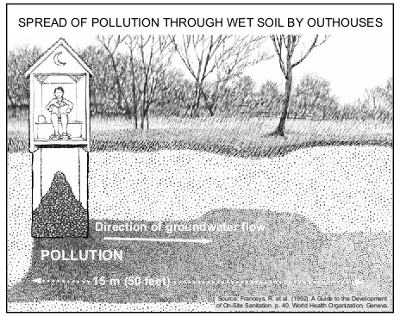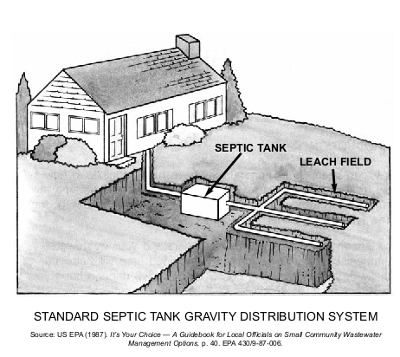
Conventional methods of sewage disposal
 Before we dive into
composting humanure, it's worth understanding what happens to your crap
if you are plugged into a conventional system. Your waste is
commonly known as sewage, but in the industry, it's generally referred
to as wastewater (or possibly blackwater if you're making a distinction
between the output of your toilet and sink). Wastewater disposal
methods range from the simple to the complex, and Jenkins does a good
job of pointing out the pros and cons of each system.
Before we dive into
composting humanure, it's worth understanding what happens to your crap
if you are plugged into a conventional system. Your waste is
commonly known as sewage, but in the industry, it's generally referred
to as wastewater (or possibly blackwater if you're making a distinction
between the output of your toilet and sink). Wastewater disposal
methods range from the simple to the complex, and Jenkins does a good
job of pointing out the pros and cons of each system.
The cheapest way to
dispose of human waste is the pit latrine, which is basically our
system at the moment. The worst problem with a pit latrine is its
tendency to leak pollutants into the groundwater, which is why an
outhouse should always be more than fifty feet away from any well or
stream. Assuming you work around that issue, other problems
include disease-transmission, annoying flies, and smell, all of which
can be avoided by keeping the humanure covered with a high carbon
material after each use.
If your outhouse isn't
grandfathered in like ours, you'll be forced to install a septic system
in most parts of the United States. Septic system owners use a
conventional toilet inside the house, then the wastewater flows to a
septic tank for solids to settle out. The liquid continues on to
a leach field, which is simply a series of buried pipes that let water
drain out into the subsoil.
The biggest disadvantage
of septic systems, in my opinion, is cost, since even the cheapest
onces will set you back at least $2,000. In addition, you have to
 pump the solids out of the
septic tank at intervals, and that material ends up being sent to a
wastewater treatment plant, which has its own problems. Finally,
Jenkins notes that concentrations of more than 40 septic systems per
square mile lead to subsurface contamination, which means that if you
and your neighbors have lots smaller than about 16 acres, septic
systems are a bad choice. (I suspect this same issue would come
into play with pit latrines/outhouses.)
pump the solids out of the
septic tank at intervals, and that material ends up being sent to a
wastewater treatment plant, which has its own problems. Finally,
Jenkins notes that concentrations of more than 40 septic systems per
square mile lead to subsurface contamination, which means that if you
and your neighbors have lots smaller than about 16 acres, septic
systems are a bad choice. (I suspect this same issue would come
into play with pit latrines/outhouses.)
In the city, wastewater
is pumped to a central treatment facility, which can use any of several
methods to treat the human waste. I won't go into wastewater
treatment plants much here since I doubt any of you are thinking of
installing one in your backyard, but Jenkins explains in great depth
why the facilities are problematic. In addition to the puzzle of
disposing of organic matter laced with toxins (due to treatment) and
the chlorinated effluent harming receiving streams, we waste energy by
treating water and then using it to flush our toilets.
The Humanure Handbook
asks us to step back and change our view of humanure. If we
consider our effluent to be a valuable form of organic matter rather
than something to dispose of, we can create systems that recycle
humanure into apples. Yes, humanure composting systems require a
little more time, but they also use less money and create less
pollution, so they fit the homesteading ethic to a T.
| This post is part of our The Humanure Handbook lunchtime series.
Read all of the entries: |
Want more in-depth information? Browse through our books.
Or explore more posts by date or by subject.
About us: Anna Hess and Mark Hamilton spent over a decade living self-sufficiently in the mountains of Virginia before moving north to start over from scratch in the foothills of Ohio. They've experimented with permaculture, no-till gardening, trailersteading, home-based microbusinesses and much more, writing about their adventures in both blogs and books.
Want to be notified when new comments are posted on this page? Click on the RSS button after you add a comment to subscribe to the comment feed, or simply check the box beside "email replies to me" while writing your comment.

If you think about it, a septic system is really no different than a simple pit facility. The tank is equivalent to the pit and the pipe system merely distributes the outflow evenly in small amounts to a larger space rather than flowing down a decreasing gradient from the pit. Surrounding the pit is a relatively small space with high contamination, tapering off to infinitesimal with distance. The septic system field has a lower maximum concentration, but is probably larger.
The big problem with contamination from human waste is that human pathogens cause human disease. Animal bacteria are usually not human pathogens. It's ok to splash around in your own toilet: you've already got those germs. They can't make you sick
doc --- That's actually one of The Humanure Handbook's author's main points --- if you're running a composting system for just your family's waste, you should know if there are any diseases to be especially careful of.
Your comparison of septic systems vs. outhouses is why I think it's so odd that outhouses are usually illegal and septic tanks are usually mandatory in rural areas....
Mark Van den Borre --- Some towns do use ponds to treat wastewater, but those are usually more like lagoons --- the wastewater flows through two or three areas of open water so that the final product is relatively clean. Folks do use constructed wetlands for greywater (or more commonly for stormwater in the mainstream.) But I don't think I'd heard of many (any?) people using it for black water.
Marco --- Homemade versions can be very cheap, but I agree that the premade ones are often just as expensive as a septic system. And unfortunately those premade ones are the type that generally pass code.
If we do get into humanure, I doubt we'd use the compost on the vegetable garden. We have so many fruit trees that need to be fertilized every year that there's no need to risk it. I figure if you apply humanure in late winter and cover it with mulch, by the time fruit could fall on it, any pathogens would be long gone.
Anonymous --- You're right that worms, especially, can last a long time in the soil. The author of The Humanure Handbook writes about them a lot, explaining that roundworm eggs can last for up to ten years in the soil, but that hot composting (which is what he does) will kill the eggs. However, he also makes the same point doc does above --- if no one in your household has parasitic worms and you're just working with your own humanure, you're not going to get worms from it.
Everett --- I didn't realize you had a composting toilet at your place. I hope you'll post about it!
There is a relatively new system on the market that is basically a waste water plant for your home. It is extremely efficient in that it processes the waste for 23.75 hours per day then disposes of the purified (98%)water through an irrigation system into the landscape where nature takes care of the rest. While it is not cheap it doesn't cost much more than a traditional septic system with much less ground disturbance. I would think that someone could build their own system if they had a mind to. The reason they have not become more popular yet is the municipalities are to eager to make money in the poop business. One day they will be part of every new home built.